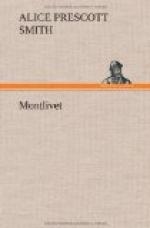He had a keen ear, for, even to my forest-trained sense, the sound came but faintly. The crowd hushed its breathing, and the air was unwholesomely still. A dog yelped, and an Indian silenced it with a kick. Each paddle-stroke threw the canoes into sharper relief, and we could distinguish lank arms, and streaming hair. The prisoner’s voice echoed as clear as if he were in some great playhouse, and were singing to gain the plaudits of a friendly throng.
I felt my blood tingling in my fingers’ ends. It was a brave song, bravely sung. I could not understand the English words, but the sound was rollicking with defiance. It was a glove thrown in our faces; the challenge of a brave man to a cowardly foe.
“The plucky beggar!” I said half aloud, and I set my teeth hard.
But Cadillac was nudging my elbow. “You said that the prisoner was a man of importance,” he accused, with a perplexed frown. “But, listen! He has the voice of a boy.”
I was greedy to hear, so, with a wave of the hand, I shook Cadillac away. But, in truth, I was disturbed. The tones were certainly boyish.
The canoes came within bowshot, and the hush that held the camp suddenly broke like the release of pent waters. There were yells and stamping, the smash of tom-toms, and a scattering salvo of musketry. It was a united roar that shut out from our consciousness the thought of the calm sky and the silent water.
The canoes had come as unswervingly as arrows, and the one that held the prisoner landed at my feet. I looked up, and met his eyes, and I swept my hat from my head.
“You are among friends,” I called, not knowing that I did so.
It was a foolish speech, since the prisoner could not understand; but I suppose that my tone was kind, for it apparently gave him courage. At least, a flush that might have been the color of returning hope rose in his cheeks. I was relieved at his appearance, for he was not the little lad that his song had made me fear. He was slim and beardless, but there were sorrow and understanding in his look that could not come with childhood. For the rest, he was dark and gaunt from exposure and privation. His rough woolen suit, leather-lined, hung loosely on him, but he wore it with a jauntiness that matched the bravado of his song.
Cadillac came forward in welcome. He was always an orator that the Indians themselves envied, and now his rhetoric was as unhampered as though he thought that the prisoner was following each flowing syllable. As he unbound the stiffened arms—they were pitifully thin and small, I thought—he called all mythology to witness his deep regret that this indignity should have been offered to his brother of the white race. I followed him and listened, storing away metaphors even as I carried beads in my cargo. I should need all the eloquence at my command before the close of the summer, and my own tongue was always too direct of speech.




